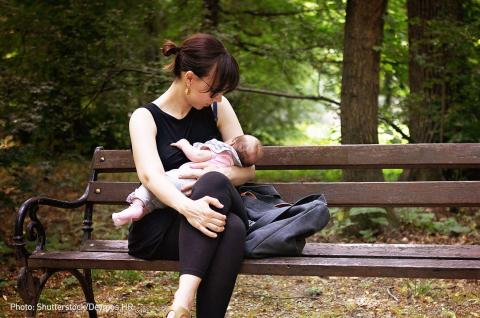
Top 10 Reasons the ACLU Fights for Breastfeeding Rights
This post was originally published on the ACLU's site and is being cross posted here, with permission.
A few weeks ago, a mom named Jessie Maher was breastfeeding her baby in the cafeteria of a Target store in Connecticut when a belligerent man approached and said she was “F*ing disgusting” and “nasty.” Fellow shoppers and Target employees quickly sprang to Maher’s defense, shielding her from the man.
“You shouldn’t be ashamed of feeding your baby,” one of them said to Maher. “This is a beautiful moment right now. If he doesn’t like it, he can go.”
Maher posted a video of the incident that quickly went viral, generating more than 8.5 million views and an outpouring of support from fellow nursing mothers.
The health benefits to breastfed babies are well-documented. But the Target incident should remind us that breastfeeding is a civil rights issue, too. In our society, we tend to treat pregnancy as if it ends with childbirth, and push nursing mothers into the shadows.
So, in honor of world breastfeeding week, we provide 10 reasons why breastfeeding should be considered a right that all of us should spring to defend — whether or not we have had a baby or breastfed or ever intend to.
- Breastfeeding affects a heck of a lot of people.
There were close to 4 million births in the U.S. in 2014 alone. About 77 percent of mothers at least start out breastfeeding, so approximately 3 million Americans every year will breastfeed their babies. And since about 80 percent of women will have a child during the course of their lives, if this hasn’t already affected you – or your wife, partner, sister, or daughter – there’s a good chance it will in the future.
- Removing barriers to breastfeeding helps women to continue participating fully in society.
Without the right to nurse in public and at work, those of us who choose to breastfeed would be confined to the home because most newborns nurse at least every two to three hours. Too often, we find ourselves shunted into public bathrooms to feed our newborns, which, even assuming we can find one at the right time with a screaming, hungry baby, is unsanitary. And using a breastpump in public is even harder. The ability to breastfeed (and pump milk) thus implicates one of our most fundamental freedoms — the liberty to exist in the public world.
- Protecting working mothers’ right to nurse promotes women’s economic security.
Women are the primary or sole breadwinner in close to half of all households. In 2012, 57 percent of women with children under one year old had already returned to work — and 40 percent return to work fewer than three months after giving birth. Outside of a few states and cities, there is no mandate for paid family leave in the U.S. This creates a conflict: If you’re breastfeeding and are back at work, unless you pump breast milk on roughly the same schedule the baby feeds, you risk losing your milk supply or developing engorgement, pain, and infection. Thus, without the ability to pump on the job, most of us would physically not be able to reenter the workforce until we’d weaned. (Not surprisingly, early return to work is associated with a shorter duration of breastfeeding.) Just as we shouldn’t have to decide between having a baby or keeping our jobs, we shouldn’t have to give up breastfeeding in order to continue working.
- Normalizing breastfeeding vindicates existing legal protections.
Given the fundamental liberty interests at stake and the strongmedical consensus that breastfeeding provides significant health benefits, it’s appropriate that the laws of 49 states and the District of Columbia broadly protect a woman’s right to breastfeed in public. And both state and federal laws, like the Reasonable Break Time for Nursing Mothers Act (which was passed as part of the Affordable Care Act, a.k.a. Obamacare), support continuation of breastfeeding once we return to work. Fighting to enforce these protections can help normalize breastfeeding and create more awareness of existing rights.
- Bringing breastfeeding into the public sphere helps fight sex stereotypes that hurt all of us.
The notion that a woman’s proper place is in the home is shockingly still prevalent. Angela Ames, an office worker who sought pumping accommodations on her first day back from maternity leave, was told “maybe you should just go home to be with your babies” before being pressured to resign. Ashley Provino, a hairstylist, was refused breaks to pump, forcing her to cut her hours to part time; her employer ultimately fired her, stating that work was no longer “her first priority.” Attitudes like these harm all of us, whether or not we ever have a baby or breastfeed: Even women with no children may be forced to confront a presumption that they will eventually have babies and leave the workforce. And the “motherhood penalty”— where earnings and career advancement drop off when women have kids (while men’s actually rise) — is well-documented. We need to combat these sex stereotypes wherever they exist.
- Breastfeeding is a fundamental and personal reproductive decision.
How you feed your baby is a fundamental and personal decision about your body and how to plan and raise your family, just like decisions about family planning and abortion. That decision should be yours to make: No one — not the government, not your employer — should get to make it for you. Fighting for the right to breastfeed should not be equated with pressuring women to breastfeed —any more than fighting for the right to access abortion should be equated with pressuring women to have abortions. But the freedom to make these decisions about our own bodies is an essential ingredient for equality, as well as a question of fundamental human dignity.
- Protecting the right to breastfeeding furthers reproductive justice.
Having a right to choose whether to breastfeed is worth little if our life circumstances prevent us from exercising it. Despite the state and federal protections mentioned above, numerous barriers still exist, particularly for low wage women and women of color. Although 77 percent of women overall initiate breastfeeding, rates drop sharply in the months following birth. A recent study confirmed that lower-income women are half as likely as higher-income women to have access to adequate pumping accommodations at work, and a third of women indicated that employment posed a challenge to breastfeeding. The unequal access to conditions that make breastfeeding possible is particularly troubling given the barrage of public health messages promoting breastfeeding. That’s why the ACLU has fought barriers to breastfeeding in some of the toughest work environments, like factories, retail, the service industry, transportation, and policing.
- Removing barriers to breastfeeding promotes racial equality.
Of course, barriers to breastfeeding tend to have the harshest impact on women of color, who disproportionately work in low-wage jobs with rigid schedules and less progressive policies when it comes to balancing work and family obligations. The racial gap in breastfeeding rates, which exists right out of the gate, increases more sharply in the months following birth for both African-Americans and Latinas. While this racial gap causes some to think of breastfeeding as a “white women’s issue,” this attitude ignores the racial and economic roots of the gap, as well as the important advocacy taking place within communities of color to close it. And it results in some of the most critical structural barriers to economic and civic equality remaining unchallenged.
- Removing barriers to breastfeeding promotes gender equality.
The reality is that most public spaces and workplaces are still structured around the needs of people who do not get pregnant, give birth, breastfeed, or have caregiving responsibilities (in other words, an able-bodied cisgender man with a female partner). The failure to take these realities into account puts women at a significant disadvantage, both in the workplace and in the public sphere. In order for women to be able to participate, contribute, and compete on an equal footing with men, we need to make accommodations related to pregnancy and breastfeeding a given at work and in public — by, for example, requiring pregnancy accommodations at workand installing nursing/pumping facilities in airports and public buildings.
- Promoting breastfeeding rights challenges objectification of women.
While some may prefer to remain covered while nursing, we should not be forced to “cover up” because there is nothing shameful or disgusting about our bodies, our breasts, or breastfeeding. The amount of exposure is typically equivalent to what you’d see at the beach, on a billboard ad, or in a store window. Ultimately, if you don’t like the sight, then you are free to leave or look away (as the woman in the Target video advises the belligerent man, “then don’t look!”). Or you could use the creative ideas for breastfeeding covers suggested in this blog post.



The views and opinions expressed in this post are those of the author(s) and do not necessarily reflect those of MomsRising.org.
MomsRising.org strongly encourages our readers to post comments in response to blog posts. We value diversity of opinions and perspectives. Our goals for this space are to be educational, thought-provoking, and respectful. So we actively moderate comments and we reserve the right to edit or remove comments that undermine these goals. Thanks!